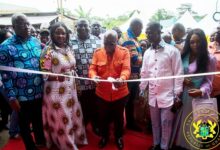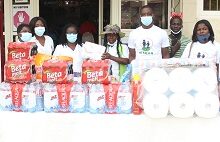
A two day stakeholders’ workshop on a new project dubbed the Ghana Landscape Restoration and Small-Scale Mining Project (GLRSSMP) has been held in Bolgatanga, in the Upper East Region.
The six-year US$103 million project is jointly funded by the government of Ghana and World Bank with support from the Global Environment Facility, International Development Association, PROGREEN and Extractives Global Programmatic Support, among others.
The project is aimed at supporting the implementation of Ghana’s Natural Resources Management and Sustainable Landscape Restoration Project.
It is being implemented under the auspices of the Ministry of Environment, Science and Technology (MESTI) and the Ministry of Lands and Natural Resources.
The review and planning forum brought together stakeholders from Northern Ghana, including directors and officers from the Ministry of Food and Agriculture, Environmental Protection Agency, Forestry Commission and Wildfire Division.
The project is building on lessons, experiences and successes from implementing the Ghana Sustainable Land and Water Management and Forest Investment Projects.
The project targets the Northern Savannah Zone, including the Guinea Savannah ecological zone, the Sudan Savannah ecological zone, and the upper portions of the Transitional Ecological Zone, and Cocoa Forest Landscape including parts of the Forest Ecological Zone and the Pra River Basin.
The Project Coordinator in charge of Landscape Restoration, GLRSSMP, Mr Isaac Charles Acquah Jnr, speaking at the workshop, noted that the project would not only strengthen integrated landscape and formalise artisanal and small-scale mining, but would also play a vital role in enhancing national development when successfully implemented.
The project, he said, would help improve institutional and regulatory framework with focus on strengthening the enabling environment and integrated landscape management, to promote improved sustainable agricultural productivity, sustainable small scale mining and sustainable forest and water resource management.
Mr Acquah said “The GLRSSMP will provide a unique opportunity for the project to collaborate with other ongoing land restoration and mining projects in the country to tackle the challenges created by the illegal small scale miners within the landscape.”
He said these included pollution of water bodies and their immediate environs, destruction of farmlands and forest reserves which had negative consequences on food security, human health, environmental quality improvements and other aspects of national development.
MrAcquahsaid the project among other things would contribute to protecting and ensuring access to natural resources and building the resilience of the poor and vulnerable population and reducing their vulnerability to climate-related extreme events.
Mr Asher Nkegbe, Upper East Regional Director, Environment Protection Agency (EPA), noted that interventions from the Sustainable Land and Water Management Project (SLWMP) would be employed to strategically implement the project to reduce poverty and vulnerability to climate change impact.
FROM SAMUEL AKAPULE, BOLGATANGA







